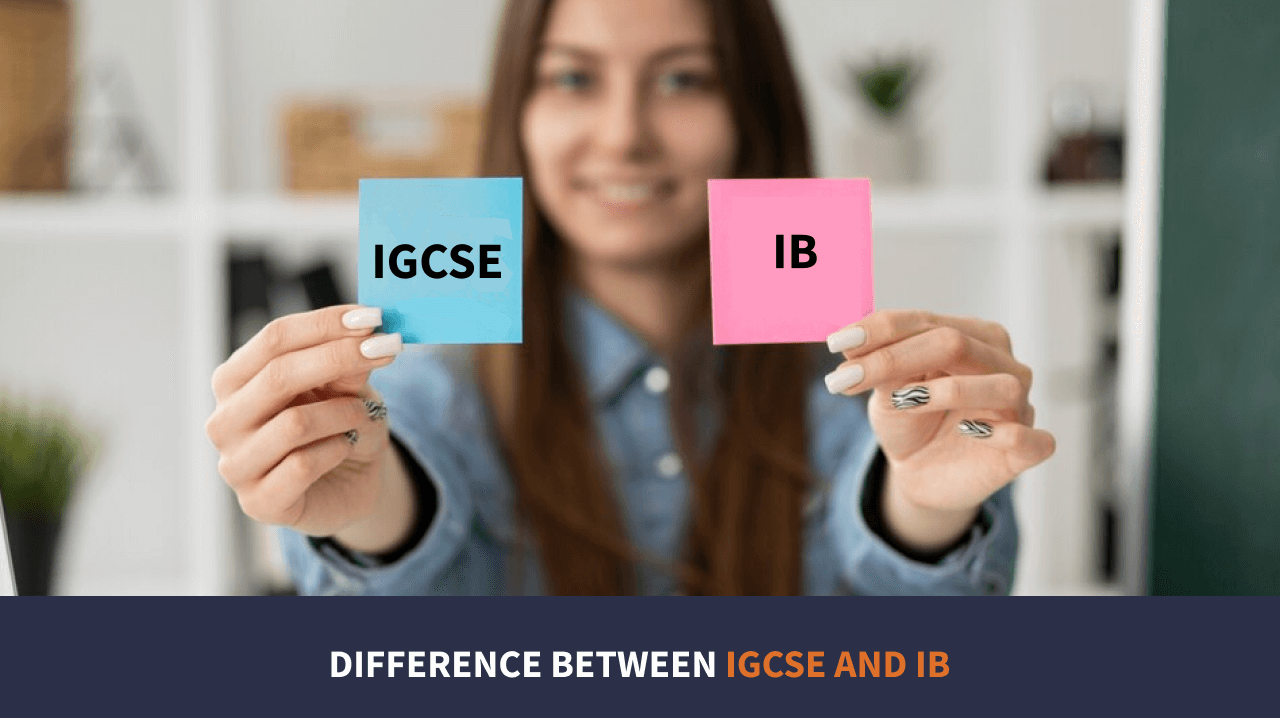Difference Between IGCSE and IB

The International General Certificate of Secondary Education (IGCSE) and International Baccalaureate (IB) are two popular international school curriculums offered at many institutions globally, including international schools in Pune.
Understanding the key differences between these two curriculums is important for students, parents, and educators when deciding which system best suits a child’s needs and learning style.
This article explains what each program is, their history, structure, testing, and grading.
What is IGCSE?
The IGCSE was started in 1988 by Cambridge Assessment International Education. It combines parts of different education systems from around the world into one curriculum that can be used internationally. The IGCSE is offered in over 150 countries globally. It is widely accepted and valued by top universities worldwide.
Curriculum Design
The IGCSE curriculum aims to provide flexible study across 5 to 14 subjects. It focuses more on applying understanding rather than just textbook learning. Subjects like Math, Science, History and Languages are emphasized.
Testing and Grades
IGCSE testing includes coursework and exams. Grades range from A* to G, with A* the highest. The tests are made and marked by Cambridge Assessment to ensure standardisation globally. Testing aims to evaluate not just knowledge gained but skills application also.
What is IB?
The IB Diploma Program was started in 1968 with the goal of creating a standardized curriculum and qualification for university admission that would be globally recognized. The IB emphasizes critical thinking to develop knowledgeable students across a comprehensive curriculum.
IB Curriculum Programs
The IB curriculum is tailored for students ages 3-19 years. The Primary Years Program focuses on academic and social development for ages 3-11 years. The Middle Years Program prepares 11-16 year olds for the Diploma Program. The Diploma Program is a challenging 2-year course for 16-19 year olds to prepare for university.
IB Testing and Grades
IB uses grades ranging 1-7 for each subject, with 7 the highest grade. Assessments compare students against set standards, not other students. This measures individual progress.
Key Differences Between IGCSE and IB
The IB vs IGCSE curriculums take different approaches when it comes to areas like subject focus, teaching methods, assessments, flexibility, and recognition.
Understanding these key differences can help students choose the program that best matches their learning needs and style.
Curriculum Focus: Depth vs. Breadth
The IGCSE curriculum aims to provide flexibility and offer instruction across a variety of subjects. This gives students exposure to topics in breadth.
On the other hand, IB programs like those offered at IB schools in Pune such as MIT Gurukul have an in-depth focus on critical thinking and analysis within each subject.
Teaching Methodology and Learning Approach
The teaching methodology also differs – IGCSE emphasizes teacher-directed instruction while IB utilizes more student-centered and inquiry-based methods.
IB’s approach encourages students to take ownership of their learning through exploration, questions and making connections themselves.
Assessment and Evaluation Techniques
While IGCSE uses more formal examination assessment, IB intersperses testing throughout courses using assignments, presentations, projects etc alongside a final exam. This frequent testing model aims to reduce student stress.
IB’s grading also differs by comparing students against set criteria rather than curving grades based on cohort performance.
Flexibility and Subject Choice Options
IGCSE offers more flexibility and choice when it comes to subjects studied – students can opt for 5 to 14 subjects based on interests and specialization focus areas. IB streamlines subject options more, requiring students to select one subject from each of the key groups within the curriculum.
Recognition by Universities and Institutions
Both IGCSE and IB Diploma are globally recognized university entry credentials – top education systems acknowledge they prepare students well for college coursework. However, some US universities have preferred giving advanced credit for IB courses completed versus IGCSE.
Pros and Cons of IGCSE
The IGCSE curriculum offers several benefits as an internationally recognized qualification. Some pros of taking IGCSE exams include:
- Provides flexible subject choices across a broad range of topics
- Develops core skills in reading, writing, math and science
- Assessed through a combination of project work and final exams
- Grading shows student’s level of proficiency across subjects
- Accepted worldwide for further education and employment
However, there are some downsides that should also be considered:
- Less emphasis on analytical thinking and critical evaluation
- Exam-based assessment can cause stress for some students
- Less opportunity to explore subjects in great depth
- Perceived as less rigorous than other pre-college programs
Pros and Cons of IB
The International Baccalaureate (IB) program aims to nurture critical thinking and subject mastery through its internationally recognized curriculum. Benefits of IB include:
- Students encouraged to ask questions and make connections across subjects
- Taking unique Theory of Knowledge course to reflect on the nature of learning
- Option to complete career-related study alongside academic subjects
- Assessments designed to reduce student stress levels
- Earning college credits at some universities based on IB exam scores
However, some challenges students may face with the IB Diploma are:
- Heavy workload required across several subjects simultaneously
- Fixed curriculum provides less flexibility in subject choices
- Perceived as more suitability for highly academic focused students
- Schools must undergo authorization process to offer IB program
Choosing Between IGCSE and IB
When deciding between the IGCSE and International Baccalaureate curriculum, students should consider IB if they want to focus more on critical analysis, making connections across students, and learning research and communication skills.
The IB approach encourages students to construct their own understanding through exploration and self-reflection. While the workload is demanding, it aims to produce lifelong learners prepared for university education.
IB assessments also reduce stress by avoiding high-stakes examinations. Students hoping to attend colleges in the USA may find IB more favorable as some institutions provide course credits based on exam scores.
Overall, the IB system suits self-driven students looking for a more well-rounded yet academically rigorous pre-college experience.
Final Thoughts
At MIT Gurukul, one of the top good residential schools in Pune, we offer IB Diploma to meet different learning needs. We encourage students and parents to have in-depth discussions with our advisors to determine which curriculum aligns best with individual talents, skills and higher education goals.
By understanding these key contrasts between the IGCSE IB difference curriculum and systems, parents can make an informed decision to set students up for success.

